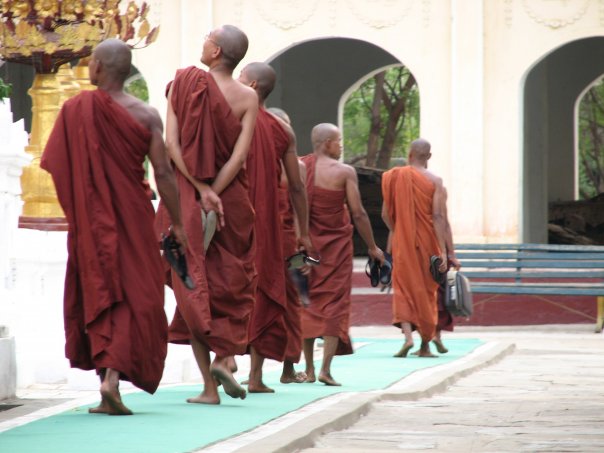“If this is the type of superficial hippie that we have teaching our children its no wonder we are turning out people wholly unequipped to survive in the global economy.”
Both these comments were made in an online forum in response to the Edinburgh Evening News article about my bare foot protest. I’m not going to lose any sleep over them but they are interesting to reflect upon.
The comment about an education system that is “turning out people wholly unequipped to survive in the global economy” is an interesting one. While I am certainly not willing to accept the blame, I do see evidence that there is some truth in the statement. When the system works well young people leave school capable of accessing information via the newspapers. Their education has not however, equipped them with the tools to process and act on that information. For this reason issues like climate change, environmental destruction, third world poverty, civil war and indeed injustice in Burma and many other countries are either kept at arms length or taken on board to the detriment of the individual’s mental health.
I am not interested in churning out young people equipped only with the skills to take their place as another cog in the machine that is the global economy. I am excited by the possibility that young people might leave school with the passion and skills to change the world for the better. The place to begin is by confronting the issues instead of pretending that they are not there. Learning about something is a “head” activity. Allowing it to effect you on an emotional level is a “heart” activity and recognising that the pain one feels when confronting issues of social and environmental justice is to be embraced and used as a call to action can be thought of as a “hand” activity. The current system of education focuses almost exclusively on the “head” and neglects the other two parts of the trilogy.
I have been open since the beginning about the fact that I was motivated by pain in the form of grief. Since this is so rarely acknowledged it is in itself a powerful statement. Something I have learned over the past month is that by taking action it is possible to hold onto that grief and still feel good about life. The situation in Burma is still desperate and yet by becoming actively involved I am empowered by the possibility of change for the better. This is the personal benefit of action. I have been accused of being a dreamer and perhaps I am. If the alternative is to be a cynic I am certain that I am better off dreaming.
I heard it said recently that a cynic is someone who has given up but not yet shut up. I was searching unsuccessfully online for the originator of the quote and came across the following:
“The cynic is one who never sees a good quality in a man, and never fails to see a bad one. He is a human owl, vigilant in darkness, and blind to light, mousing for vermin, and never seeing noble game.”
Henry Ward Beecher
(Rather mean to owls I think)
“What is a cynic? A man who knows the price of everything and the value of nothing.
Oscar Wilde
“A Cynic is a man who, when he smells flowers, looks around for a coffin.”
H. L. Mencken
“Cynicism is not realistic and tough. It’s unrealistic and kind of cowardly because it means you don’t have to try.”
Peggy Noonan
“An idealist believes the short run doesn’t count. A cynic believes the long run doesn’t matter. A realist believes that what is done or left undone in the short run determines the long run.”
“A cynic is not merely one who reads bitter lessons from the past; he is one who is prematurely disappointed in the future”
Sydney J. Harris
“A cynic is just a man who found out when he was about ten that there wasn’t any Santa Claus, and he’s still upset.”
James Gould Cozzens
Jesus said to his disciples: “Why do you see the speck in your neighbour’s eye, but do not notice the log in your own eye?”
The reason we cannot find good in others is that we are so blinded by our own faults. If the window in our kitchen is dirty we will see the washing on our neighbour’s line as less than clean. The way to clean our window – clear our vision – is to be aware of the limitations of our vision and simply refuse to pick out the weakness in others but concentrate instead on the good.
Alastair McIntosh reflected on the comments (positive as well as negative) made on the forum in Thought for the Day on BBC Radio Scotland.
For a Head, Heart and Hand approach to education see http://www.che.ac.uk/





